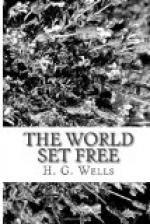And, unpremeditated, undesired, out of the accumulations of his tilling came civilisation. Civilisation was the agricultural surplus. It appeared as trade and tracks and roads, it pushed boats out upon the rivers and presently invaded the seas, and within its primitive courts, within temples grown rich and leisurely and amidst the gathering medley of the seaport towns rose speculation and philosophy and science, and the beginning of the new order that has at last established itself as human life. Slowly at first, as we traced it, and then with an accumulating velocity, the new powers were fabricated. Man as a whole did not seek them nor desire them; they were thrust into his hand. For a time men took up and used these new things and the new powers inadvertently as they came to him, recking nothing of the consequences. For endless generations change led him very gently. But when he had been led far enough, change quickened the pace. It was with a series of shocks that he realised at last that he was living the old life less and less and a new life more and more.
Already before the release of atomic energy the tensions between the old way of living and the new were intense. They were far intenser than they had been even at the collapse of the Roman imperial system. On the one hand was the ancient life of the family and the small community and the petty industry, on the other was a new life on a larger scale, with remoter horizons and a strange sense of purpose. Already it was growing clear that men must live on one side or the other. One could not have little tradespeople and syndicated businesses in the same market, sleeping carters and motor trolleys on the same road, bows and arrows and aeroplane sharpshooters in the same army, or illiterate peasant industries and power-driven factories in the same world. And still less it was possible that one could have the ideas and ambitions and greed and jealousy of peasants equipped with the vast appliances of the new age. If there had been no atomic bombs to bring together most of the directing intelligence of the world to that hasty conference at Brissago, there would still have been, extended over great areas and a considerable space of time perhaps, a less formal conference of responsible and understanding people upon the perplexities of this world-wide opposition. If the work of Holsten had been spread over centuries and imparted to the world by imperceptible degrees, it would nevertheless have made it necessary for men to take counsel upon and set a plan for the future. Indeed already there had been accumulating for a hundred years before the crisis a literature of foresight; there was a whole mass of ‘Modern State’ scheming available for the conference to go upon. These bombs did but accentuate and dramatise an already developing problem.
Section 2




